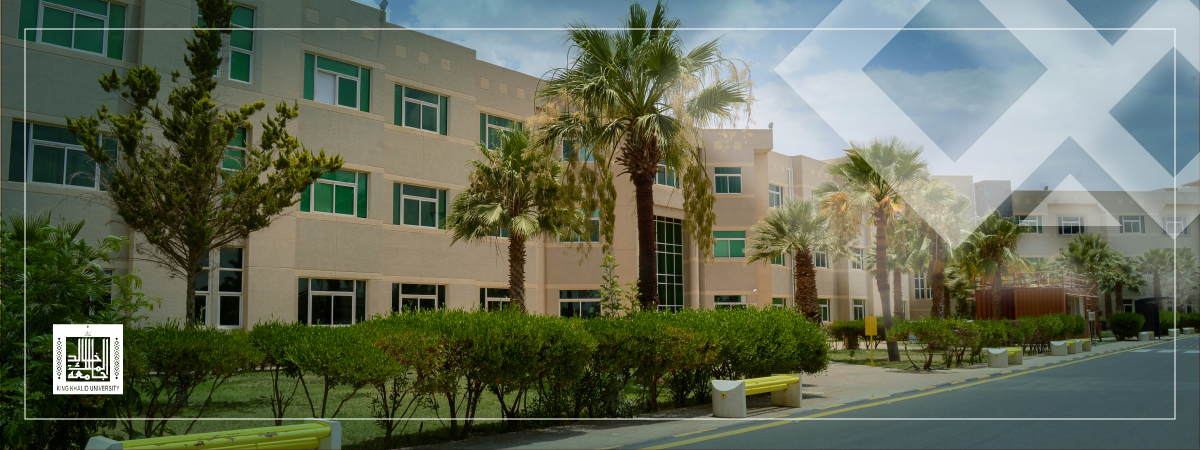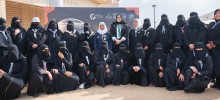14 Universities Participate in Virtual Meeting on Women Leaders in Saudi Higher Education During the COVID-19 Pandemic

The first women's academic leadership meeting entitled "Women Leaders in Saudi Higher Education During the COVID-19 Pandemic" was concluded yesterday evening. The meeting was held by the university's agency for female student affairs under the patronage of His Excellency Rector Al-Solamy and aimed to present King Khalid University's experience and strategies during the COVID-19 pandemic. A key portion of the meeting discussed innovative solutions to support work during the pandemic for the fall 2020 semester. Of note, 14 Saudi universities and more than 370 female leadership figures attended.
The participants focused on the universities' role in activating distance learning to develop human capital. It called for the activation of remote work through holding councils and virtual meetings and ending administrative requirements, including those related to human resources while providing medical counseling services for female students.
Vice Rector of Female Academic Affairs, Kholoud Abu Melha, delivered the opening remarks and reviewed the most significant achievements during the COVID-19 pandemic, addressing the status of scholarship students and the "Mobaderoon" initiative. After, Vice Dean of Female Affairs, King Saud University, Dr. Haya Al-Fouzan, talked about studying the feasibility of distance education in the upcoming semester.
Vice Dean of E-Learning, King Abdulaziz University, Dr. Lamia Baharith, reviewed the university's plan for digital transformation to distance education. She then reviewed the services provided to special needs students.
Vice Rector of Imam Abdul Rahman bin Faisal University for Female Student Affairs, Dr. Amira Al-Jaafari, spoke about the university's role in crisis and risk management with the implementation of several initiatives during the crisis. She also discussed the mechanisms implemented to achieving the faculty members' "teaching in extraordinary times" meeting as well as a system of remote correspondence and a guide to how to perfect distance work.
Vice Rector of Umm Al-Qura University for Female Student Affairs, Dr. Sarah Al-Khouli, and the Vice Dean of E-Learning and Distance Learning at Umm Al-Qura University, Dr. Hana Yamani, participated by reviewing Umm Al-Qura University's experience during the COVID-19 pandemic, considering that the university is in the geographical framework of the Holy Land at the Kingdom of Saudi Arabia. They also reviewed the virtual meeting system and its success in fulfilling the university requirements.
Vice Dean of Graduate Studies at the Saudi Electronic University, Dr. Haya Zaidan, reviewed the university's experience in forming a central supervisory committee in coordination between Saudi universities to apply distance learning, in addition to presenting the draft of the national license for the educational platform (Blackboard). She also offered a comparison of e-learning tools and distance education between Saudi universities, educational campaigns, training courses and seminars on the COVID-19 pandemic.
Undersecretary of Al-Jouf University for Female Student Affairs, Dr. Asmaa Sulaiman, stressed the role of Al-Jouf University in forming an urgent committee to prepare for the quarantine. She then commended the Princess Madawi Bint Saud initiative to encourage female students to read. After, she detailed the university's contribution to the "Health Shopping" initiative was launched by His Royal Highness Prince Faisal bin Nawwaf bin Abdulaziz, Governor of Al-Jouf, to prevent the emerging coronavirus to provide self-sterilizing devices at the university.
Undersecretary of Bisha University for Female Student Affairs, Dr. Al-Jawhara Al-Dossary, reviewed the prominent role of Bisha University in addressing the COVID-19 crisis in the educational fields with the implementation of several service initiatives for the university and the local community.
The meeting was concluded with several recommendations in which the most important was deemed to be the activation of a student fund, which will provide laptops for low-income students. The recommendation also included activating partnerships between GCC, MENA, and international universities on how a wide array of student-centered programs.
Vice Dean of Northern Borders University for Student Affairs, Dr. Mona Al-Shazly, spoke about handing over the housing buildings to the region's emirate to host patients.
Vice Dean of E-Learning at the University of Najran, Dr. Samar Al-Harbi, reviewed the university's experience in e-learning and its approach to the Coronavirus pandemic in terms of education, in addition to the most critical initiatives that the university offered to serve its employees and society.
Vice Dean of the College of Science and Humanities at Mahmaah University, Dr. Noura Al-Shehri, mentioned the role of Majmaah University in establishing a Crisis and Emergency Management Committee to study developments and to provide appropriate recommendations.
Dean of Community Service at Shaqra University, Dr. Naglaa Mohamed, explained the university's role in the COVID-19 pandemic by activating the "We Continue to Serve You" initiative to educate and university members and the local community.
Deanship of E-Learning Supervisor, University of Tabuk, Hanadi Al-Juhani, reviewed the role of the University of Tabuk in facing the COVID-19 pandemic through the implementation of the "mastered" program and the development of a virtual academic guidance system.
Vice Rector for Student Affairs at Taif University, Dr. Eman Al-Zahrani, spoke about the university's activation of the campaign "Ramadan With Us," the virtual university guidance, the creation of the first digital art exhibition, the opening of virtual clinics, and the implementation of the summer enrichment program.
The meeting was concluded with several recommendations in which the most important was deemed to be the activation of a student fund, which will provide laptops for low-income students. The recommendation also included activating partnerships between GCC, MENA, and international universities to launch a wide array of student-centered programs.









